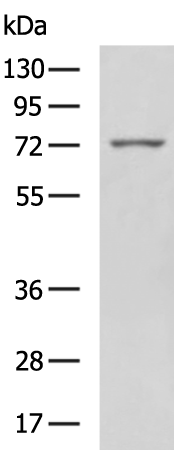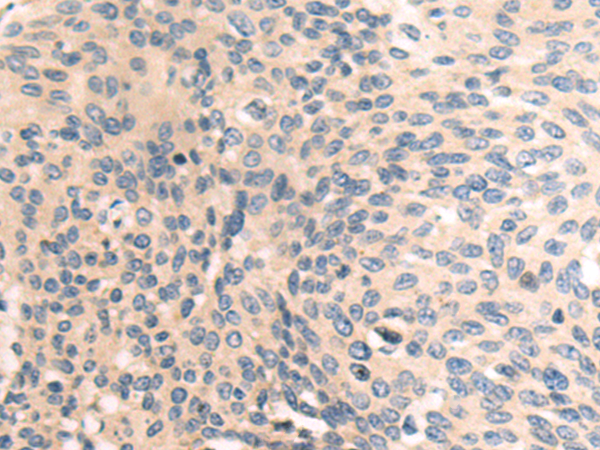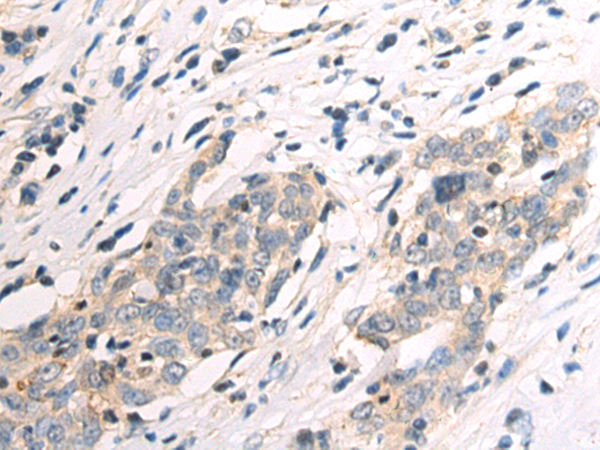


| WB | 咨询技术 | Human,Mouse,Rat |
| IF | 咨询技术 | Human,Mouse,Rat |
| IHC | 1/50-1/200 | Human,Mouse,Rat |
| ICC | 技术咨询 | Human,Mouse,Rat |
| FCM | 咨询技术 | Human,Mouse,Rat |
| Elisa | 1/5000-1/10000 | Human,Mouse,Rat |
| Aliases | M11S1; GPIAP1; RNG105; GPIP137; GRIP137; p137GPI |
| WB Predicted band size | 78 kDa |
| Host/Isotype | Rabbit IgG |
| Antibody Type | Primary antibody |
| Storage | Store at 4°C short term. Aliquot and store at -20°C long term. Avoid freeze/thaw cycles. |
| Species Reactivity | Human, Mouse, Rat |
| Immunogen | Fusion protein of human CAPRIN1 |
| Formulation | Purified antibody in PBS with 0.05% sodium azide and 50% glycerol. |
+ +
以下是关于CAPRIN1抗体的3篇代表性文献示例,包含文献名称、作者及摘要概括:
---
1. **文献名称**:*CAPRIN1 is a novel prognostic marker and promotes tumor progression in colorectal cancer*
**作者**:Li Y, et al.
**摘要**:该研究通过免疫组化(使用抗CAPRIN1抗体)分析结直肠癌组织中CAPRIN1的表达,发现其高表达与患者不良预后相关。机制研究表明,CAPRIN1通过激活Wnt/β-catenin通路促进肿瘤侵袭和转移。
2. **文献名称**:*CAPRIN1 regulates RNA granule formation and translation in stress conditions*
**作者**:Solomon S, et al.
**摘要**:研究利用CAPRIN1特异性抗体进行Western blot和免疫荧光实验,发现CAPRIN1在细胞应激条件下参与RNA颗粒的形成,并通过调控特定mRNA的翻译影响细胞存活。
3. **文献名称**:*Targeting CAPRIN1 as a therapeutic strategy in triple-negative breast cancer*
**作者**:Wang X, et al.
**摘要**:通过shRNA敲低CAPRIN1并结合抗体介导的蛋白检测,证明CAPRIN1在三阴性乳腺癌中通过调控细胞周期蛋白促进增殖,提示其作为治疗靶点的潜力。
---
以上文献示例展示了CAPRIN1抗体在疾病机制、预后分析和靶向治疗研究中的应用。如需具体文献,建议通过PubMed或Google Scholar以“CAPRIN1 antibody”为关键词进一步检索。
CAPRIN1 (Cell cycle-associated protein 1) is a multifunctional RNA-binding protein involved in regulating mRNA translation, cell proliferation, and stress granule formation. It plays critical roles in cell cycle progression, particularly during the G1/S phase transition, and is implicated in cancer development, neurodevelopmental disorders, and immune responses. CAPRIN1 interacts with proteins like G3BP1 to modulate stress granule dynamics under cellular stress and influences pathways such as Wnt/β-catenin signaling.
CAPRIN1 antibodies are essential tools for studying its expression, localization, and molecular interactions. These antibodies are widely used in techniques like Western blotting, immunofluorescence, and immunohistochemistry (IHC) to investigate CAPRIN1's overexpression in cancers (e.g., breast cancer, hepatocellular carcinoma) and its association with tumor aggressiveness. Commercially available antibodies target specific epitopes, with validation often performed using knockout cell lines or recombinant protein controls. Recent studies highlight CAPRIN1's potential as a therapeutic target, particularly in cancers where it promotes metastasis and chemoresistance. However, antibody specificity remains a consideration due to protein isoforms and post-translational modifications. Ongoing research continues to explore CAPRIN1's roles in neurodegenerative diseases like Alzheimer's, expanding the utility of these antibodies in diverse biomedical contexts.
×